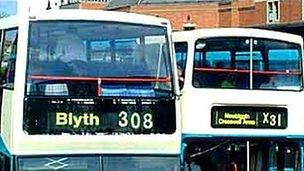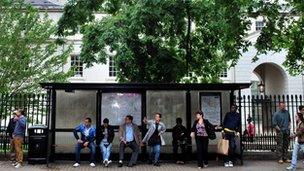Warning of bus wars over political power grab in north
- Published
- comments

Bus routes could be determined by councillors not companies in the future
It's been 25 years since bus services were deregulated, removing much of the power politicians had over public transport.
But now councillors in the North East may be about to grab some of that clout back.
The transport authority in Tyne and Wear is considering taking back control of bus routes, timetabling and fares.
They want to set up something called a Quality Contracts Scheme.
That would allow the councillors on the local transport authority to decide which routes they want the bus companies to run and decide how much passengers pay.
And you can understand why they want to take back some control.
Simpler fare structure?
The taxpayer currently funds almost half the cost of bus travel in Tyne and Wear, with the transport authority paying more than £60 million in subsidy to the private companies.

Supporters of quality contracts argue passengers would get a greater say over fares and routes
But despite paying out that money, the councillors from the authority have almost no influence when routes are withdrawn or fares raised.
And as funding cuts bite, the Tyne and Wear transport authority fears it will be powerless to stop vital routes being lost.
Instead the bus firms will call all the shots.
But under quality contracts, the transport authority would decide which routes are run and then open them up to tender.
The transport authority would pay a set amount to the bus operator, but keep the proceeds from the fares.
The authority argues it could then set the fares to allow popular services to cross-subsidise the less profitable, socially valuable routes that are currently so vulnerable.
It also says the change would allow it to introduce a much simpler fare structure to replace the dozens of different charges made by competing bus firms.
Bernard Garner, from Nexus - the publicly-owned company which runs the transport system - believes the change will benefit passengers.
He said: "We need a system that is easier to use and to understand - a comprehensive network not just a series of individual services.
"And it needs to deliver value for money - both for passengers and for the council tax payers who put a lot of money into bus services."
Massive subsidy
The bus companies don't like the idea though.
They believe some routes could end up needing massive subsidy, and that the system could fall apart if the network doesn't get the projected number of passengers.
The North East Bus Operators Association says that would leave the taxpayer facing an even bigger bill at a time when the money simply isn't there.
And Sir Brian Souter, chief executive of Stagecoach, has even said he would rather "take poison" than hand over control of bus services to the politicians.
Legal action by the bus operators is a distinct possibility.
Some then are calling for a different solution.
Newcastle Liberal Democrat Greg Stone, who sits on the transport authority, believes a voluntary agreement with the bus companies offers a better way forward.
He says some politicians have a rose-tinted view of the age before deregulation.
He said: "A voluntary partnership arrangement between the public and private sectors would lead to better results for both sides on this.
"I think the way we're going is going to lead to a war between the transport authorities and the bus companies.
"That will only end up hurting the passenger in terms of the cost to the taxpayer."
Avoiding competition
But some believe the bus companies have too cosy a life at the moment.
A recent Transport Select Committee, external report accused North East bus companies of having a "non-aggression pact", effectively avoiding competition in some areas.
One North East Labour MP believes quality contracts could tackle that.
Houghton and Sunderland South's Bridget Phillipson said: "What this system would deliver is greater transparency about how money's being spent, but it would also give local people more of a voice.
"At the moment they are frustrated that there isn't one simple ticketing system, and that they don't have a say when routes are cut."
She has already gathered 1,500 signatures supporting her campaign for quality contracts to be introduced.
The members of the Tyne and Wear authority will make a decision on whether to adopt the new system later in September.
But if they do, that may just be the start of a protracted battle between companies and councillors about who should be in charge of the bus network.